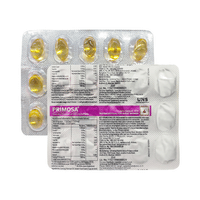Rs.2488for 1 vial(s) (2 ml Injection each)
food interaction for Lupi-Fsh Injection
alcohol interaction for Lupi-Fsh Injection
pregnancy interaction for Lupi-Fsh Injection
lactation interaction for Lupi-Fsh Injection
food
alcohol
pregnancy
lactation
No interaction found/established
It is unsafe to consume alcohol with Lupi-Fsh 150 Injection
UNSAFE
Lupi-Fsh 150 Injection is highly unsafe during pregnancy. It can cause serious harm to the unborn baby, including birth defects and pregnancy loss. Do not use this medicine if you are pregnant or planning to become pregnant.
UNSAFE
Information regarding the use of Lupi-Fsh 150 Injection during breastfeeding is not available. Please consult your doctor.
CONSULT YOUR DOCTOR
SALT INFORMATION FOR Lupi-Fsh 150IU Injection
Urofollitropin(150IU)
Lupi-fsh injection uses
{med_name} is used in the treatment of female infertility. It is used in women who have a problem with ovulation or are undergoing fertility treatment like in-vitro fertilization.
How lupi-fsh injection works
In females, Lupi-Fsh 150 Injection works by stimulating the release of estrogen which helps in the growth and development of the egg before release. It also helps to develop more follicles (eggs) in women undergoing assisted reproductive technology procedures.
Common side effects of lupi-fsh injection
Abdominal pain, Headache, Bloating, Pelvic pain, Abdominal cramp, Nausea, Respiratory disorder, Hot flushes
SUBSTITUTES FOR Lupi-Fsh Injection
28 Substitutes
28 Substitutes
Sorted By
 Rs. 4787pay 277% more per Injection
Rs. 4787pay 277% more per Injection Rs. 1870.64pay 48% more per ml of Injection
Rs. 1870.64pay 48% more per ml of Injection Rs. 1832pay 47% more per Injection
Rs. 1832pay 47% more per Injection Rs. 1665.47pay 31% more per Injection
Rs. 1665.47pay 31% more per Injection Rs. 2538.75pay 100% more per Injection
Rs. 2538.75pay 100% more per Injection
Expert advice FOR Lupi-Fsh Injection
- Your doctor may prescribe more than one medicine as part of a pregnancy plan.
- The injection is administered under the skin. Follow the recommended dosage and monitoring schedules to minimise the possibility of ovarian hyperstimulation.
- Inform your doctor immediately if you have severe pelvic pain, nausea, vomiting, diarrhea, sudden weight gain, trouble breathing, or decreased or no urination during treatment, as these could be symptoms of ovarian hyperstimulation syndrome (OHSS).
- Do not use Urofollitropin if you are already pregnant or breastfeeding.
- Pregnancy following treatment with Urofollitropin is more likely to result in a multiple pregnancy (twins or more) than if you had conceived naturally.
- Urofollitropin stimulates the production of eggs in women having treatment for anovulatory infertility.
Frequently asked questions FOR Lupi-Fsh 150IU Injection
Urofollitropin
Q. How and in what dose should I take Lupi-Fsh 150 Injection?
It is given as an injection just under the skin by a medical healthcare professional only. The dose and treatment duration depends on your ovarian response for which you would be constantly monitored by your doctor during the treatment.
Q. What if I miss a dose of Lupi-Fsh 150 Injection?
Ideally, you should try not to miss a dose of Lupi-Fsh 150 Injection. However, please talk to your doctor as soon as you remember that you have missed a dose.
Q. What are the side effects of using Lupi-Fsh 150 Injection?
The most common side effects are headache and pain in the abdomen. The other common side effects include hot flushes, nausea, vomiting, diarrhea, rashes and breast tenderness. If any of these side effects bother you, please consult with your doctor. In addition, this medicine may increase the likelihood of conditions like ovarian hyperstimulation syndrome (OHSS) and multiple pregnancy.






















